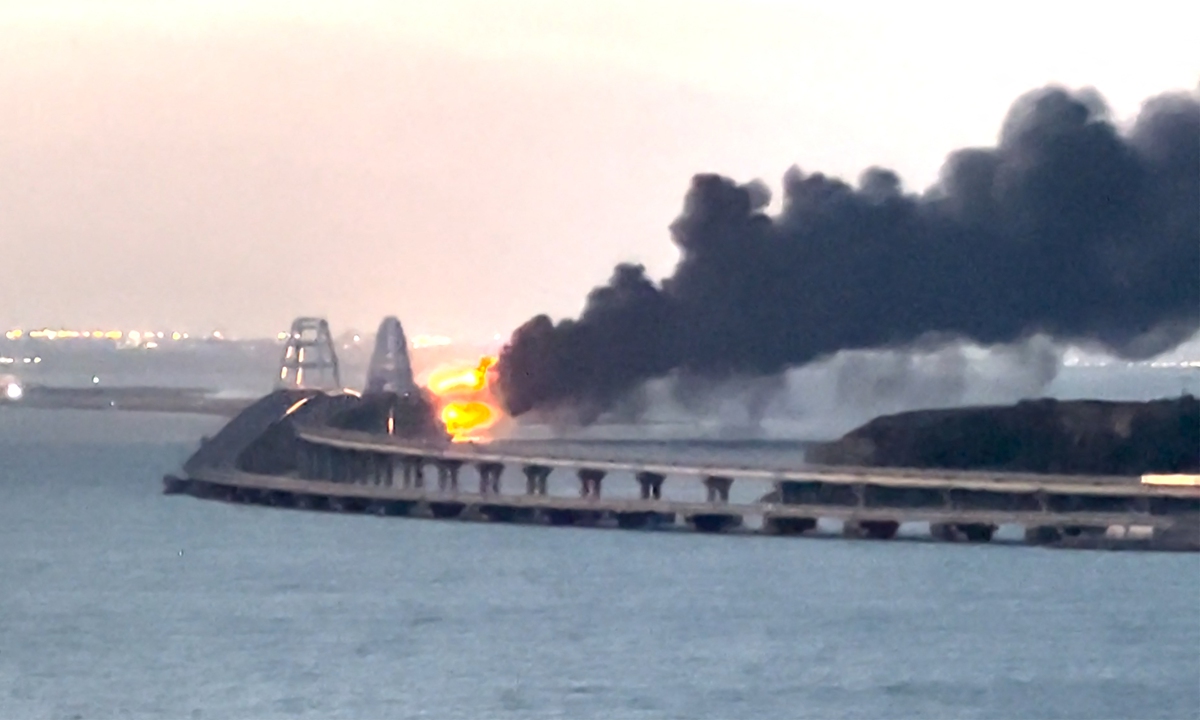
This video grab taken and released on October 8, 2022 shows thick black smoke rising from a fire on the Crimean Bridge that connects the Crimean Peninsula with mainland Russia.Photo: AFP
The past few days have been filled with shocks in the Russia-Ukraine conflict, which is getting increasingly unpredictable before our eyes. To begin with, the Kerch Bridge, which connects the Crimean Peninsula with mainland Russia, was hit by a deadly explosion. Russia called the attack a terrorist act by the Ukrainian side on Sunday and retaliated on Monday.
The conflict itself seems to have gone from being a powder keg to becoming a nuclear reactor, due to certain forces which have been fanning war flames. Among them was US President Joe Biden's radical rhetoric of so-called threat of Armageddon.
On Thursday last week, Biden said the risk of nuclear "Armageddon" is the highest it has been for 60 years, when talking about the war. On Sunday, White House National Security Council spokesperson John Kirby walked back Biden's comment by saying a possible "Armageddon" wasn't an imminent threat, and that the US doesn't have "any indication" that Putin has made a decision to use nuclear weapons. This is the second time the White House has tried to cool down concerns on the "Armageddon" comments. White House Press Secretary Karine Jean-Pierre made similar remarks on Friday.
Observers have thus been debating whether Biden was confused, reckless, or deliberate.
Quite a few observers tend to believe that Biden simply spelt out his real thoughts, intentionally or unintentionally. And his comments can be viewed as preemptive strike in public opinion toward Russia, or as a trial balloon to test the tipping point of Russia's tolerance in the face of provocation. That's what the US does, as it is so used to being a bully - provoke to the limit, and then hold the other side responsible for whether the tension will become a crisis.
The US enjoys seeing the escalation of the war. The development of the conflict does not at all depend on whether Ukraine is really determined to fight to the last Ukrainian, but on whether the US needs the war to continue. Otherwise, it could be another story now if the US ever makes effort to promote negotiations between the two sides.
But the US has its calculations - gaining interests comprehensively from the conflict, including making Europe much more reliant on it in terms of both energy and security; exhausting Russia's strength, until Moscow will no longer be able to pursue its previous glory; and further driving a wedge between the international community and Russia, drawing in more countries to US anti-Russia camp.
Washington also wants to put up an innocent face. That's why an interesting phenomenon occurred - White House officials now have a new ritual, walking back or clarifying Biden's comments, to whitewash, or downplay the US' inciting role in the conflict.
Be it Biden's "Armageddon" comment or White House' walk-back, the seemingly confusing messages have sent one clear signal to [fool] the world - the US is not the one to blame, Russia is. Then Washington could find good excuses to keep arming Ukraine, letting the war flame burning longer. Anyhow, it is not the US, but Ukraine, Russia and ordinary Europeans that are suffering from the consequences of the war.
More and more people in European countries are taking to the streets to protest soaring energy prices, high living costs and high inflation. No one knows how rough their lives could be in this winter. Some Europeans are sobering up to the fact that the US has been taking advantage of Europe's embargo on Russian energy to boost gas prices. Addressing a conference of entrepreneurs in Paris on Thursday, French President Emmanuel Macron articulated that when the US and Norway supply his country with energy and gas, "one thing that can't go on for too long is us paying four times more than the price you sell to your industry … That is not exactly the meaning of friendship."
An ally should be dependable. Unfortunately, a US that keeps stirring up tension is not a qualified one. Biden's "Armageddon" comment not only met with Russian refutation, but also made some allies dissatisfied. "We must speak with prudence when commenting on such matters," Macron said on Saturday, adding, "I have always refused to engage in political fiction, and especially when speaking of nuclear weapons."




